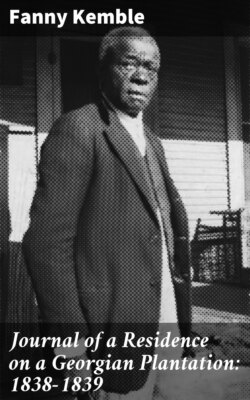Journal of a Residence on a Georgian Plantation: 1838-1839

Реклама. ООО «ЛитРес», ИНН: 7719571260.
Оглавление
Fanny Kemble. Journal of a Residence on a Georgian Plantation: 1838-1839
Journal of a Residence on a Georgian Plantation: 1838-1839
Table of Contents
PREFACE
JOURNAL
Отрывок из книги
Published by Good Press, 2019
goodpress@okpublishing.info
.....
I must inform you of a curious conversation which took place between my little girl and the woman who performs for us the offices of chambermaid here—of course one of Mr. ——'s slaves. What suggested it to the child, or whence indeed she gathered her information, I know not; but children are made of eyes and ears, and nothing, however minute, escapes their microscopic observation. She suddenly began addressing this woman. 'Mary, some persons are free and some are not (the woman made no reply). I am a free person (of a little more than three years old). I say, I am a free person, Mary—do you know that?' 'Yes, missis.' 'Some persons are free and some are not—do you know that, Mary?' 'Yes, missis, here,' was the reply; 'I know it is so here, in this world.' Here my child's white nurse, my dear Margery, who had hitherto been silent, interfered, saying, 'Oh, then you think it will not always be so?' 'Me hope not, missis.' I am afraid, E——, this woman actually imagines that there will be no slaves in Heaven; isn't that preposterous now? when by the account of most of the Southerners slavery itself must be Heaven, or something uncommonly like it. Oh, if you could imagine how this title 'Missis,' addressed to me and to my children, shocks all my feelings! Several times I have exclaimed, 'For God's sake do not call me that!' and only been awakened, by the stupid amazement of the poor creatures I was addressing, to the perfect uselessness of my thus expostulating with them; once or twice indeed I have done more—I have explained to them, and they appeared to comprehend me well, that I had no ownership over them, for that I held such ownership sinful, and that, though I was the wife of the man who pretends to own them, I was in truth no more their mistress than they were mine. Some of them I know understood me, more of them did not.
But to return to our Ganymedes. One of them—the eldest son of our laundrywoman, and Mary's brother, a boy of the name of Aleck (Alexander)—is uncommonly bright and intelligent; he performs all the offices of a well-instructed waiter with great efficiency, and anywhere out of slave land would be able to earn fourteen or fifteen dollars a month for himself; he is remarkably good tempered and well disposed. The other poor boy is so stupid that he appears sullen from absolute darkness of intellect; instead of being a little lower than the angels, he is scarcely a little higher than the brutes, and to this condition are reduced the majority of his kind by the institutions under which they live. I should tell you that Aleck's parents and kindred have always been about the house of the overseer, and in daily habits of intercourse with him and his wife; and wherever this is the case the effect of involuntary education is evident in the improved intelligence of the degraded race. In a conversation which Mr. ——had this evening with Mr. O——, the overseer, the latter mentioned that two of our carpenters had in their leisure time made a boat, which they had disposed of to some neighbouring planter for sixty dollars.
.....